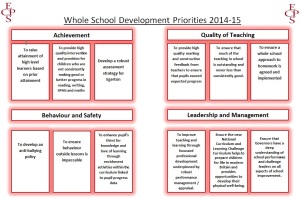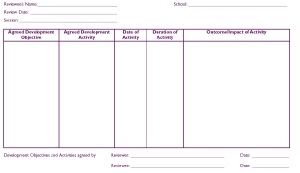In my experience school development plans (SDPs) are usually written by the Headteacher in September, possibly with the input of the senior leadership group. It is based on what they believe the school needs to do to improve. Some documents cover one year and others can cover several years. Some are lengthy and go on for pages, others have tried to ensure the SDP sticks to one side of A4.

Middle leaders are then told that they should write their own subject development plans around this whole school document.
Teachers then have to write their appraisal/performance management targets around the subject development plan or the SDP.
CPD is only ‘allowed’ or at least will only be funded if it links to the whole school plans.
Teachers that are already successful in the areas that the development plan identify as school issues, are ridiculously forced to focus on things they don’t need to focus on.
SDP targets overall are vague and require reading pages of documents to drill down to what they mean.

This system is deeply flawed and I would argue mainly inefficient. It’s not owned by all staff and is wasting the power of the many with the perceived accountability of senior leaders.
I am going to argue that some schools should rethink this process. I will use random visual examples on face value from publicly available plans shared on the Internet.
Top-bottom to bottom-top
In the model described above, the school’s priorities are derived, hopefully from a good knowledge of the teaching, teachers and students in the school but from the ‘top’. I suggest this is the wrong way round.
Teachers, support staff and depts. should have time to discuss, what they really need to develop to move forwards. There needs to be high quality conversations about what would really make a difference to their teaching and the students’ learning. This all should happen before the SDP is written.
They need to be short achievable things that the teacher believes can make a difference. They need to be realistic. What is the point of an RE teacher with 25 classes being told they have to mark their students’ books every week? It’s probably not going to happen and you’re going to end up with a very stressed, probably ill, unhappy group of teachers.
Teachers and depts may be given some overarching areas which they could choose to include or not in their development.
They then focus further on which aspect they want to develop. It must be achievable and so specific that it is ‘checkable’.
These should be flexible, open to trial and error and whilst they can be checked, they’re not being judged on. Judging something implies that the outcome should always be positive for the consequence . Trialling means it can go wrong and it doesn’t matter.
Keeping it achievable & realistic
I’m a fan of quick check lists. I propose that this set of developments (I’m avoiding the word ‘target’) should be recorded as a simple checklist for each teacher and each subject. I suggest they are mostly if not all short-term targets. They may be planned for different months or terms but if they are short term it keeps them much easier to achieve.
Instead of saying
- New schemes of learning will be written for the end of the year for Year 10 new GCSE Maths specification
It would say
Term 1a
- Agree exam board
- Agree dept. format for schemes of learning
- Agree who is writing which topic
- Agree assessment format & timings
SDP targets are whole school and lose meaning by the time they filter down to staff. These need to be turned on their head, giving the priority to specific things that need to happen, that will overall meet the desired aim.

Regular, quality reflection time
One of the big problems with the current model of SDP, dept plans and then appraisal is that they are looked at infrequently. I suggest this needs to be the main focus of any meeting/line management meeting. Discussions would be very focussed and it would be a time to appreciate the work that is being done at all levels throughout the year. Instead of looking back over the whole year at appraisal review and try to ‘come up’ with evidence of what happened in the year this would be short, quick, regular reviews. A quick 10 minute list check, every few weeks could prove to be much more effective.
It is also a way to keep focussed throughout really busy times. If the list is realistic it should be achievable. Under normal circumstances if large parts of the lists go ‘unticked’ then there was something wrong with them in the first place. As they can be month by month they can take into account unexpected events that an annual plan may not. Some times list points will need to be carried over to the next. The system is much more flexible and responds to the day to day life of teachers and depts. than a prewritten yearly one.
Where CPD is needed for part of a list then it is very clear how it will contribute. As with the trial and error model, there also needs to be an acknowledgement that sometimes CPD doesn’t have the desired impact or help move a teacher on. Leaders need to be brave enough to take this ‘hit’. We can’t pretend all CPD has the ability to instantly change things.
Pulling it all together
The final part of this model is the SDP. This is where things become complicated.
If every single member of staff, including support staff and senior leaders have their own development lists do all the lists need to be collated in to one document?
Do Governors want to see a huge document of top down targets or know that there is a highly personalised, efficient, regularly reviewed, meaningful process of trial and improvement?
Maybe SDPs should be a thing of the past and Governors need to be more involved in supporting the process of development and the steps it has rather than asking the Head if a plan is being met?

Is this needed? Is CPD more/less meaningful using this model?
CPD in this model is driven by staff; what they need to move on in their role. It becomes macro-CPD not whole school programmed. Reading a book is important and classed as CPD. A 5 minute chat with another teacher is recognised as powerful. Trials are not judged but discussed and tweaked. No more whole school priority training.
The popular current model has become so impersonal to many teachers that it may not be relevant to them; school development becomes so diluted that is everyone’s and no-one’s responsibility. This model puts the emphasis on many regular, meaningful conversations that have the power to move a school forward. Everyone is responsible and accountable for their own development which in turn leads to whole school development.



